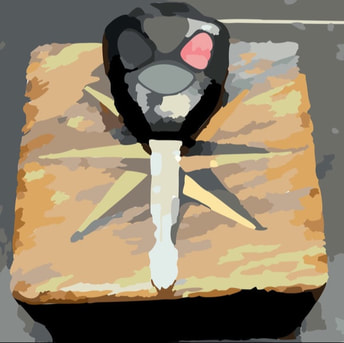 Templates used in image by RawPixel.com Templates used in image by RawPixel.com Spring was church visits time for my family. From February through May we hardly ever attended our home church, instead we would visit different congregations where my dad would give the Camp Report, mom the Sermon, and together they would often do the Children’s Story. But pastors didn’t want Camp Sunday to fall over a holiday, so Easter often found us at the Marion CoB here in Ohio. It was a good time to see grandma and grandpa before summer camp started. Palm Sunday was hit or miss, sometimes we were actually at Stone CoB, sometimes we were visiting a different congregation, either way we would more than likely find ourselves holding palm fronds. Now as a young male, it was always more exciting to get the long single frond, it would eventually be used as a sword with my brothers. Even as a young child, the cross felt inappropriate to swing like a sword, even if it is a sword in shape. Palm Sunday was special and fun, though not all that big of a deal. We got a leaf, not chocolate or gifts. But as I got older, Palm Sunday became much more problematic. “Problematic?” you may be saying, “Why?” We actually discussed this in Sunday School recently, but in case you missed that class, here is why. The palm frond would have been fairly ubiquitous in Judea, not only as a native plant, but as a symbol of Jewishness. It was commonly used as a symbol for two things: The Festival of Booths (the celebration of the Exodus), and the Hasmonean Dynasty (the last independent rulers of Judea before being overthrown by the Romans and Herod the Great (the Herod of the Nativity)). So here are a group of people waving the symbols of an independent Judea and of God leading them out of captivity while shouting, “Please save us!” (Hosanna is probably best translating as, ‘We beseech you to deliver us!) All of this happening while Jesus is fulfilling the Zechariah 9:9, “Rejoice greatly, Daughter Zion! Shout, Daughter Jerusalem! See, your king comes to you, righteous and victorious, lowly and riding on a donkey, on a colt, the foal of a donkey.” It is all very political. Is it any wonder the leaders of Jerusalem feared him? They had already experienced what happens when the Romans believe that someone is thinking about rebelling. And here comes Jesus acting like a messiah and the people calling out to him to save them as they invoke their history of salvation and independence. Jesus, as you all know, rejects this. Yes he is building a kingdom, but it is not a temporal one. There will be no earthly king setting out rules and enforcing them. Jesus’s kingdom is one that exists presently and historically as a spiritual kingdom as people come together voluntarily to live in community and a kingdom that will exist on every level when God brings it to culmination. In recent years we have seen the rise of the Christian Nationalism movement here in the U.S. It isn’t a new thing, it has existed since Constantine openly supported Christianity in 312. In short, it is the idea that our nation is and should be Christian. This doesn’t sound bad on the face of it, after all, who wouldn’t want to live in Christ-centered nation? Our ancestors did, that is why they rebelled and went into the baptism waters. Christianity at the point of a sword, or in modern day parlance, at the threat of arrest and imprisonment, is fundamentally anti-Christ. Jesus rejected the sword and instead choose the wash-basin, turned in the golden crown for thorns, gave up the throne to be raised on a cross, and to die as convict instead of ruling as king. I will still be waving the palm leaves with my children this week, it’s a fun tradition! In the back of mind though, I will be thinking about the fact that these palm leaves will wither just as the people of Jerusalem’s hopes in a Jewish Nationalist state did when Jesus was executed. I will wave my palm thinking about how we haven’t been able to accept, even after two millennia, that Jesus doesn’t want us to put him on an earthly throne. I will set my leaf on the ground and leave it, letting Jesus lead me his way and not expecting him to bend to my expectations. May God’s will be done, not mine… not mine.
0 Comments
 My brothers and I spent a lot of our time playing in the woods growing up. We would walk up and down the valley, following stream beds, exploring ridges, and looking for new and interesting places. When we were younger, the rule was that we had to be within ‘car alarm’ range. That was how we were called home, mom or dad would set off the car alarm and we could hear it from nearly anywhere on camp property and quite a ways beyond. I remember how this rule was created, it was actually before we had a car with an alarm. We had gone out sledding, if I had to guess, we were either 8, 6, and 4 or 7, 5, and 3, and we decided to follow the stream that ran behind the house. My parents hadn’t been with us as the sledding hill was the backyard. Jacob, Laban, and I had a good time exploring the icy, snowy woods. I have a fairly vivid memory of doing so, but I don’t remember how mom and dad found us. But I guess they had tried to honk the car horns to get our attention and we had ignored them. They were mad, I think we were punished, and after that boundaries were set and the car horn became our call home. Eventually, we became old enough that we could travel even further, as long as our parents had an idea of which way we were going. Part of growing up is learning about and pushing on our boundaries. They can become a source of friction between parent and child. At the same time, children thrive when they have clearly defined limits. As parents we have to slowly move them further and further out. If we move them to fast then our children can end up in a situation that they are not properly mature to handle. However, boundaries that don’t move fast enough, or at all, end up harming a child’s ability to mature and they won’t be able to handle situations that are age appropriate. Sometimes people can handle being unready fine, other times they make poor decisions and end up harming themselves intentionally or unintentionally. The same is true for our faith. When we are little our faith has very small, very rigid boundaries. “This is good and good people have good things happen to them and they go to Heaven. That is bad and bad people have bad things happen and they don’t go to Heaven. If you aren’t sure, just ask an adult, they will have the answer.” As we get older we discover that life is no where near as simple. We figure out that bad things happen to good people, that what is good and what is bad is not always clear in every situation, and no person is simply good or bad. We also begin to be clever enough to ask harder, more probing questions and may even discover that the adults don’t have all the answers. We even begin to read the Bible for ourselves and begin to come to our own conclusions as to what it says. Its hard for us adults, we continue to see our children as who they were and not what they are becoming. We think that they are not ready for a more mature faith when in fact it is we who are not ready to see them as independent believers. There are many people who try to quash young people at this point, who try to keep them in hard boundary faith. I don’t agree with this, it either creates believers that worship the boundaries instead of the God of Love or it simply chases people out of the Church because they believe that they are too sinful to belong. “But wait!” say some, “Are we not suppose to have faith like a small child?” “By all means!” I reply. (Sorry, I just really love Paul’s style.) Yes, we are called to have faith like a child, but we are also told that in Christ we are free. At times in our faith journey we will want concrete answers, but as we mature we find that we are able to accept that somethings are a mystery. We come to realize that we will never have all the answers. Like a child who doesn’t understand why clean clothes appear in their dresser, we live in the mystery of how the Trinity works and why God loves us (to name a few). We progress from not needing to, to needing to, to accepting that we are unable to know all things. As we continue the journey through Lent and towards the Cross: be at peace with not knowing the whys and hows, God has it in hand. Be a gentle and loving hand to those behind you on the path of faith as they explore their edges and continue to grow in belief. And be ready for that day when God sets off the car alarm and calls you home. Blessings |
Details
Pastor AndrewLetters from the monthly newsletter. Archives
May 2024
Categories |
We Would Love to Have You Visit Soon!
|
Sunday Worship10:30 am
|
Telephone |
|
 RSS Feed
RSS Feed
